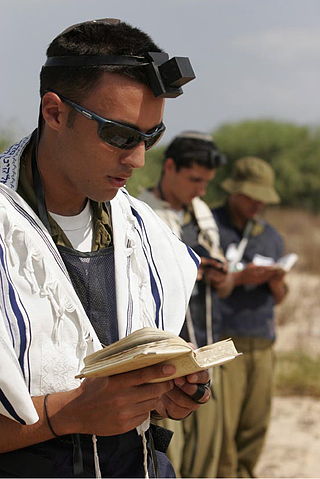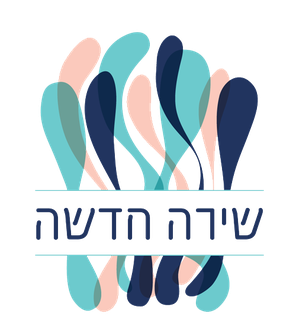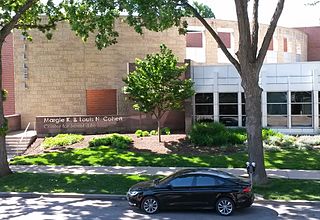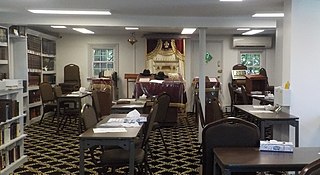
Jewish prayer is the prayer recitation that forms part of the observance of Rabbinic Judaism. These prayers, often with instructions and commentary, are found in the Siddur, the traditional Jewish prayer book.
Neo-Hasidism, Neochassidut, or Neo-Chassidus, is an approach to Judaism in which people learn beliefs and practices of Hasidic Judaism, and incorporate it into their own lives or prayer communities, yet without formally joining a Hasidic group. Over the last century neo-Hasidism was popularized by the works of writers such as Hillel Zeitlin, Martin Buber, Abraham Joshua Heschel, Lawrence Kushner, Zalman Schachter-Shalomi, and Arthur Green.

In Judaism, a minyan is the quorum of ten Jewish adults required for certain religious obligations. In more traditional streams of Judaism, only males 13 and older may constitute a minyan; in more liberal (non-Orthodox) streams women are also counted.
Rosh Pina is a lay-led independent minyan in Washington, D.C. It meets for Shabbat morning services twice a month in the National Museum of American Jewish Military History (NMAJMH). It also meets occasionally for Friday night and holiday services, in addition to organizing social and educational events such as shabbatonim and parties to celebrate Hanukkah, Purim and other Jewish holidays.

A ta'anit or ta'anis is a fast in Judaism in which one abstains from all food and drink, including water.

Shira Hadasha is a Jewish congregation in the German Colony neighbourhood of Jerusalem, which emphasizes a more expansive role for women in the synagogue. It founded in 2002 by a group of local residents, including Tova Hartman. Shira Hadasha's prayer service format has been adopted by a number of congregations in Israel, the United States, Canada, Europe, and Australia.
Partnership minyan is a religious Jewish prayer group that seeks to maximize women's participation in services within the confines of Jewish law as understood by Orthodox Judaism. This includes enabling women to lead parts of service, read from the Torah, serve in lay leadership positions, sit in a more gender-balanced format, and in some cases count as part of a minyan ("quorum") of ten men and ten women. Partnership minyanim began in 2002 simultaneously in New York and Jerusalem, and have now spread to over 30 communities in at least five different countries around the world.
Orthodox Jewish student groups exist at many secular colleges and universities in the diaspora, especially in the United States, Canada, and Europe.

Shiur is a lecture on any Torah topic, such as Gemara, Mishnah, Halakha, Tanakh (Bible), etc.
Orthodox Jewish feminism is a movement in Orthodox Judaism which seeks to further the cause of a more egalitarian approach to Jewish practice within the bounds of Jewish Law. The major organizations of this movement is the Jewish Orthodox Feminist Alliance (JOFA) in North America, and Women of the Wall (WOW) and its affiliates in Israel and internationally, known as The International Committee for Women of the Wall (ICWOW). In Israel, the leading Orthodox feminist organization is Kolech, founded by Dr. Chana Kehat. In Australia, there is one Orthodox partnership minyan, Shira Hadasha, in Melbourne.

The DC Minyan is a lay-led Jewish congregation in the Dupont Circle area of Washington, D.C., with programs including Shabbat/Sabbath and Holy Day worship services, education, social events, retreats, and opportunities for tikkun olam, improving and transforming the world. The majority of its worship services, educational programs, and special events take place at the Washington, D.C. Jewish Community Center (DCJCC).
An independent minyan is a lay-led Jewish worship and study community that has developed independently of established denominational and synagogue structures within the organized Jewish community. Some began in the late 1990s and most since the year 2000, though some are several decades older. These new groups often combine a commitment to halakha/Jewish law with egalitarianism, and strive to create worship services where traditional prayer can become "spiritual experiences".

Tikkun Leil Shabbat is an independent minyan or chavurah in Washington, DC, organized entirely by volunteer leadership and sponsored by Jews United For Justice, DC's local Jewish social justice organization. The name of the community is a reference both to Tikkun Leil Shavuot and tikkun olam. Its primary activity is Friday night, but it also meets on Jewish holidays and at other times. Tikkun Leil Shabbat attracts upward of 200 participants on Friday nights.
Hadar is an educational institution on the Upper West Side of Manhattan. The institute offers various programs to support the development of traditional egalitarian Judaism. A major component of the institute is Yeshivat Hadar, which offers both summer and year-long fellowships for students to learn full-time in the yeshiva setting. Prominent rabbis associated with the Yeshiva include co-founders Rabbi Shai Held, Rabbi Elie Kaunfer, and Rabbi Ethan Tucker.
Young Israel of Ottawa is a traditional Orthodox Synagogue located in Westboro. It is a warm and close-knit congregation that provides a full array of religious services, adult classes and family programming open to all Jews in Ottawa.

Aryeh Abraham Frimer is an American-Israeli Active Oxygen Chemist and specialist on women and Jewish law.

Hillel at the University of Illinois Urbana-Champaign is the first Hillel: The Foundation for Jewish Campus Life in the world. It was established in Champaign, Illinois in 1923. Today the organization serves around 3,500 Jewish students and their peers at the University of Illinois Urbana-Champaign and Parkland College.
Yeshiva Ohel Moshe is a Bensonhurst-based, Orthodox elementary school and shul (synagogue) founded in 1927.

Yeshiva Kesser Torah Rabbinical College of Queens is a synagogue in the Kew Gardens Hills section of Queens, New York. It was founded in 1981 by Elyakim Rosenblatt in the Briarwood section as a kiruv yeshiva. In 1994, it relocated to Kew Gardens Hills. It is known throughout the Queens Jewish community as a "minyan factory", a place where one can find a mincha minyan throughout the afternoon or maariv minyan until late into the night.

Aryeh (Robert David)Klapper is a leading American rabbi and Jewish thinker who serves as dean of the Center for Modern Torah Leadership. He is senior dayan of the Boston Beit Din, co-founder of the Boston Agunah Taskforce, and rosh kollel of the Center for Modern Torah Leadership's student fellowship program, the summer beit midrash. Klapper is known for his lectures, published academic and religious articles, and leadership in the Orthodox world. He was listed as one of Tablet Magazine's "Rabbis You Should Know" in 2014.










